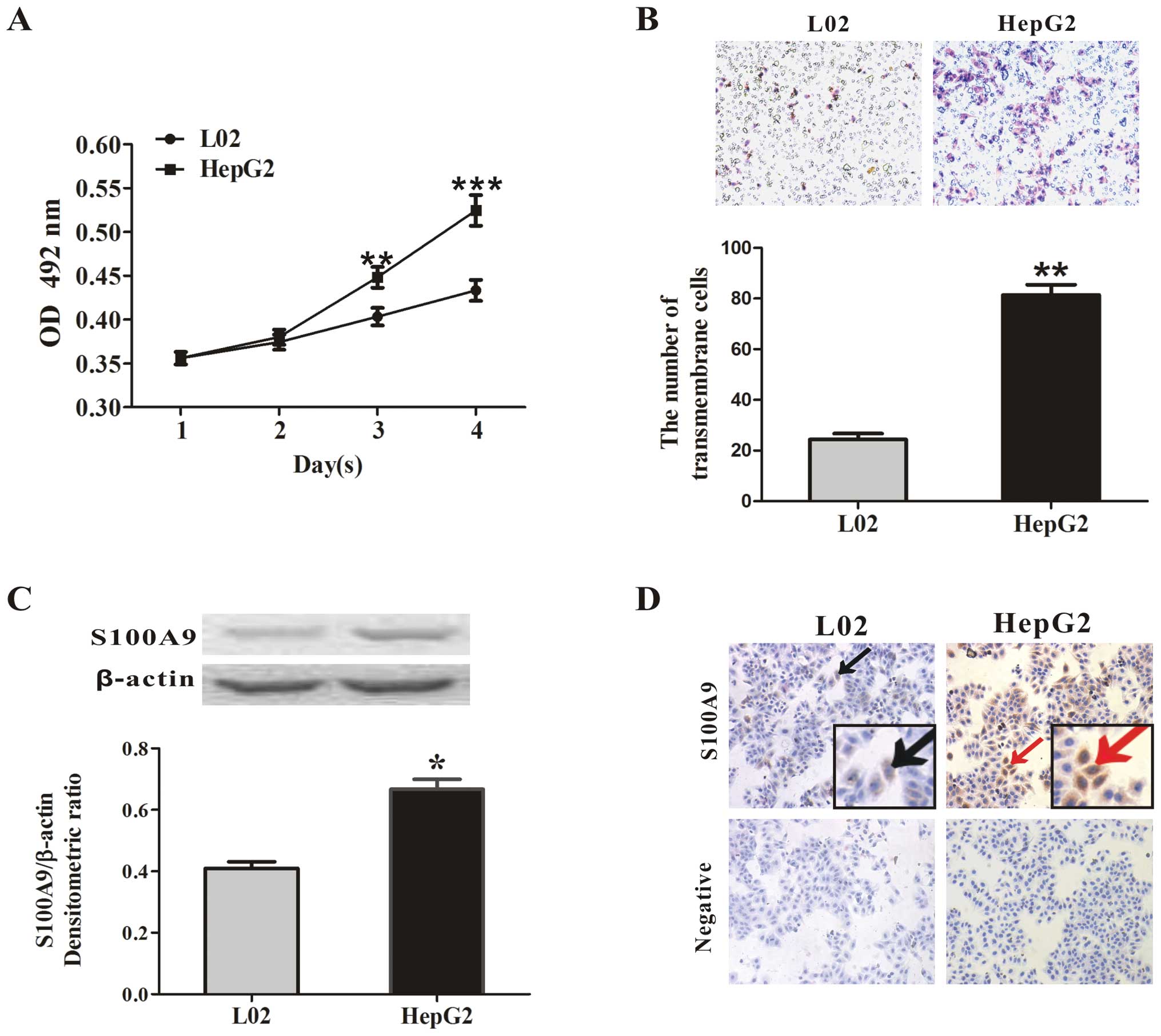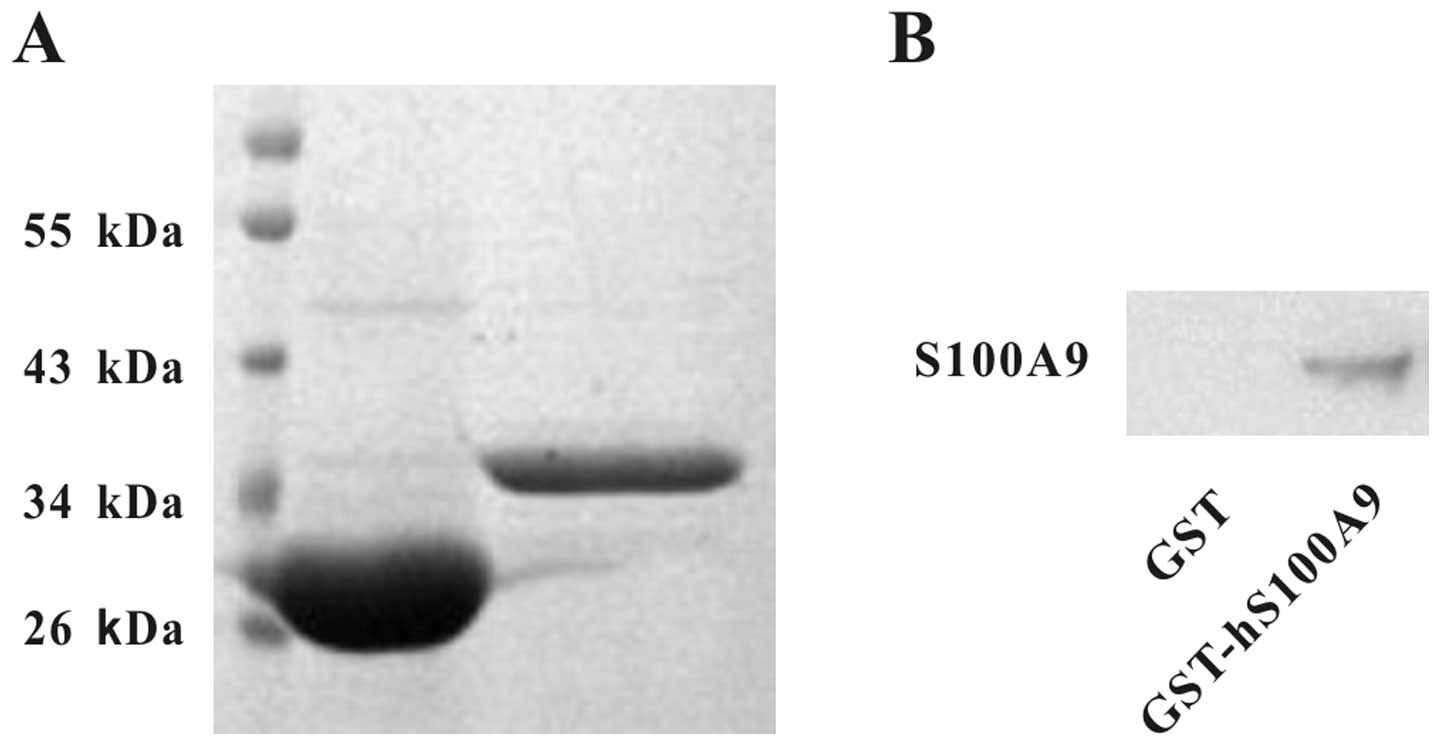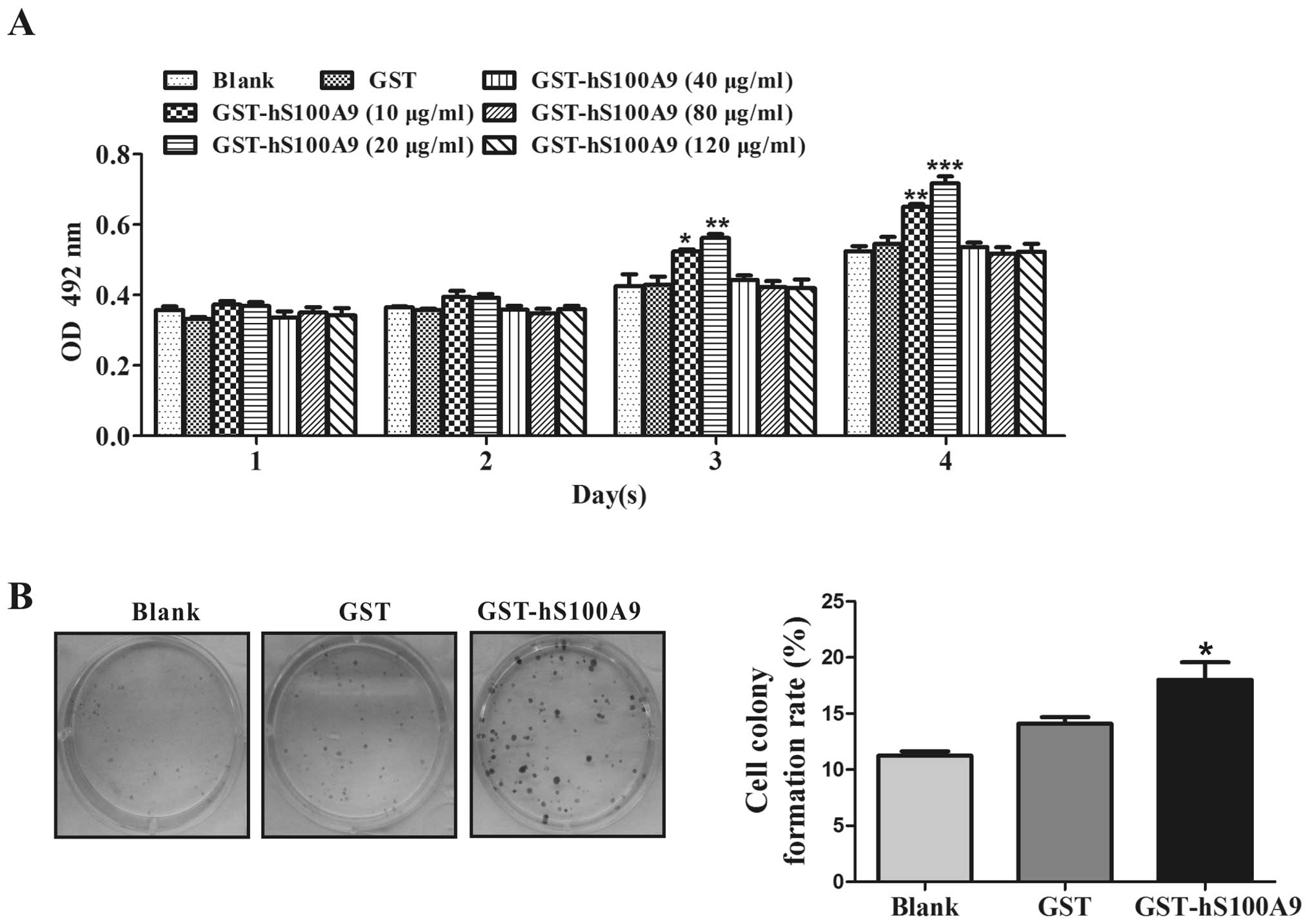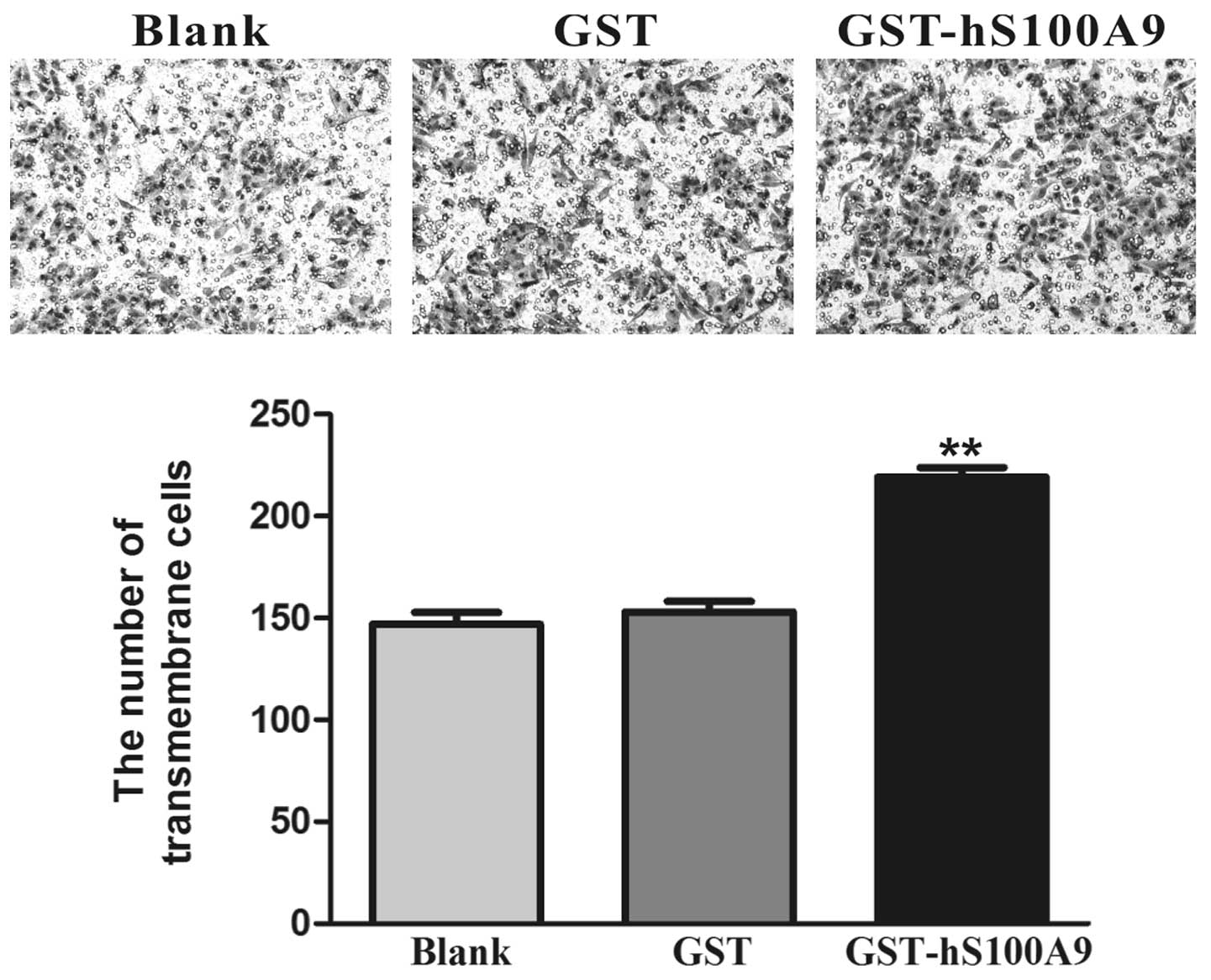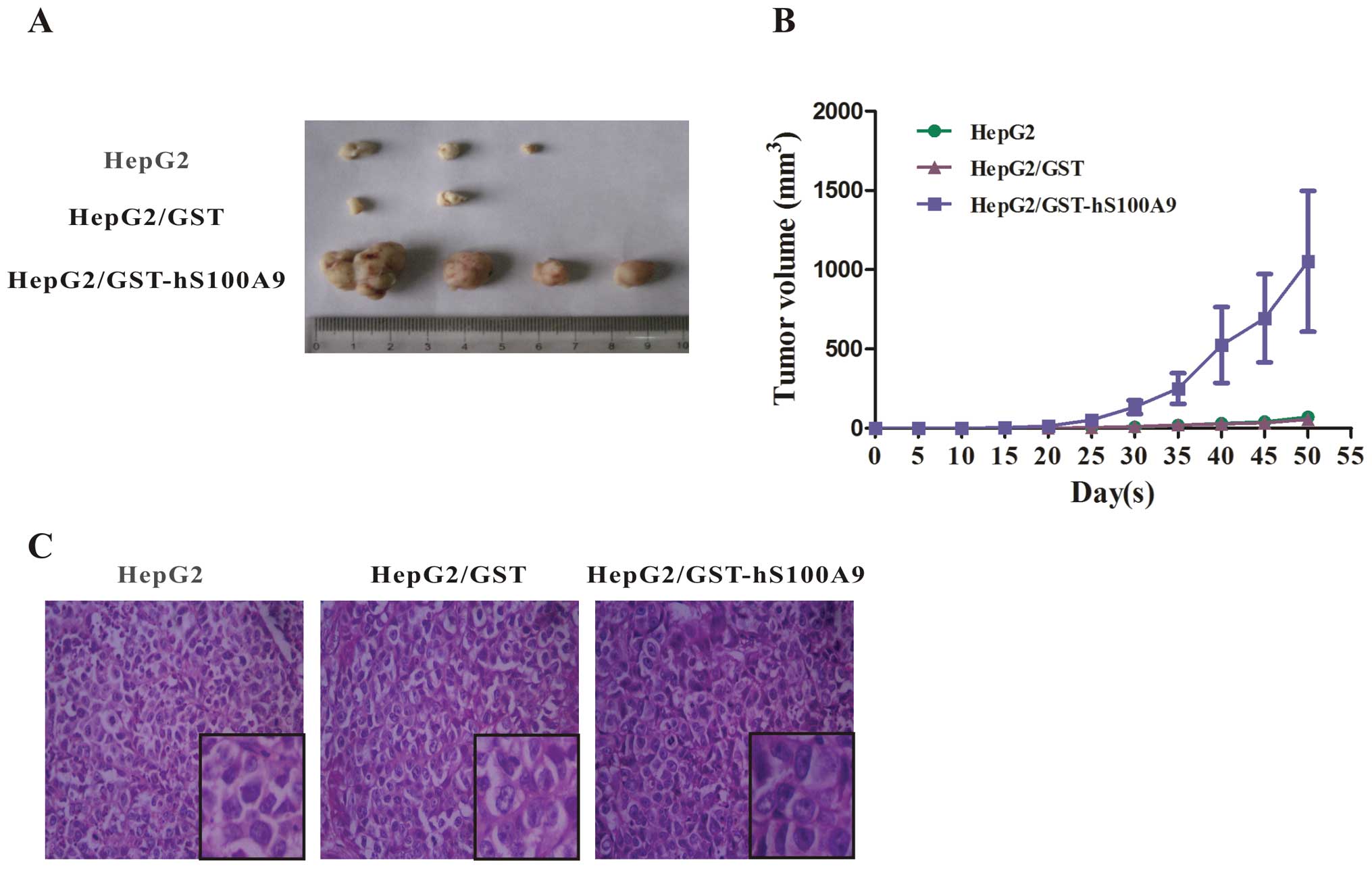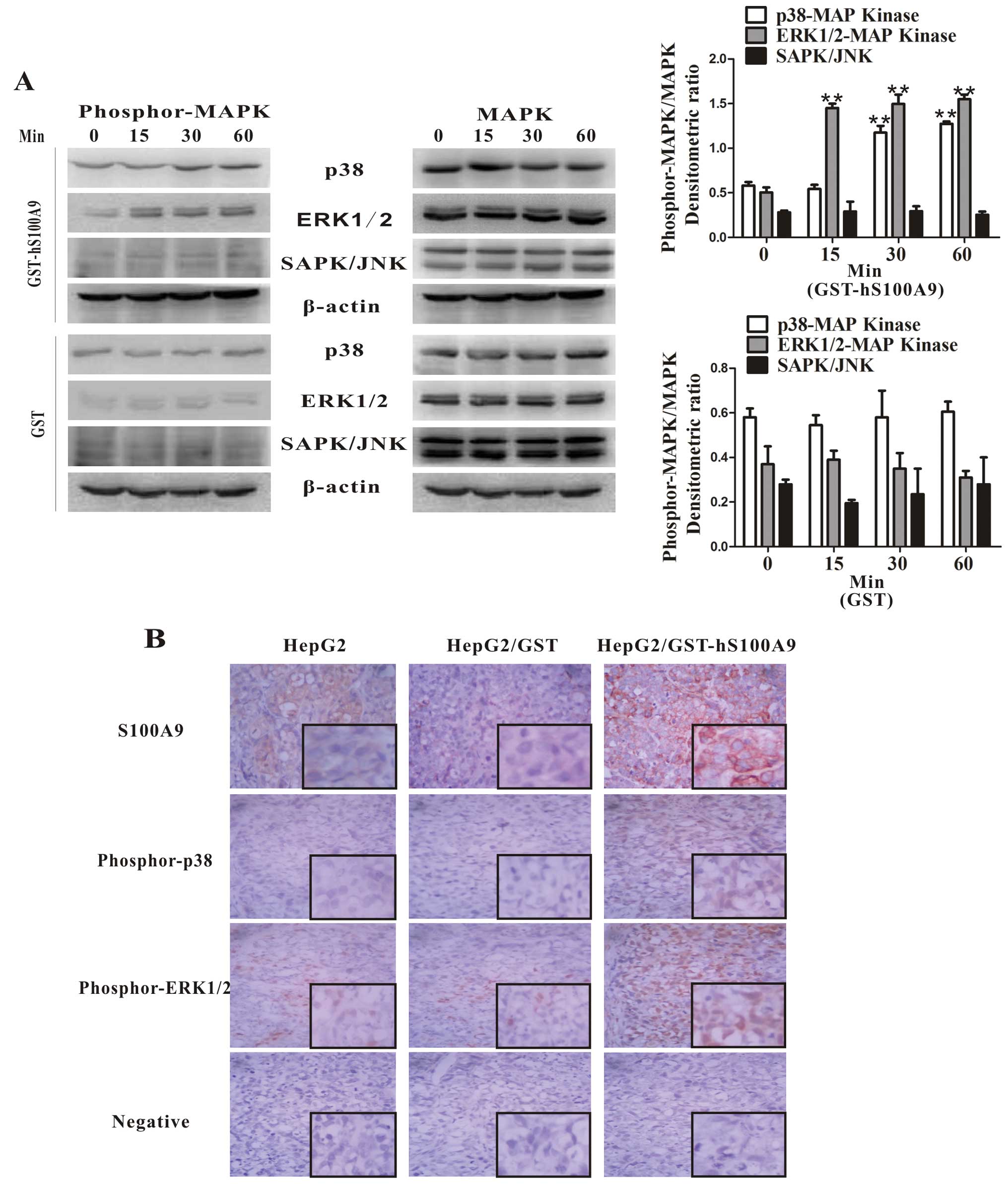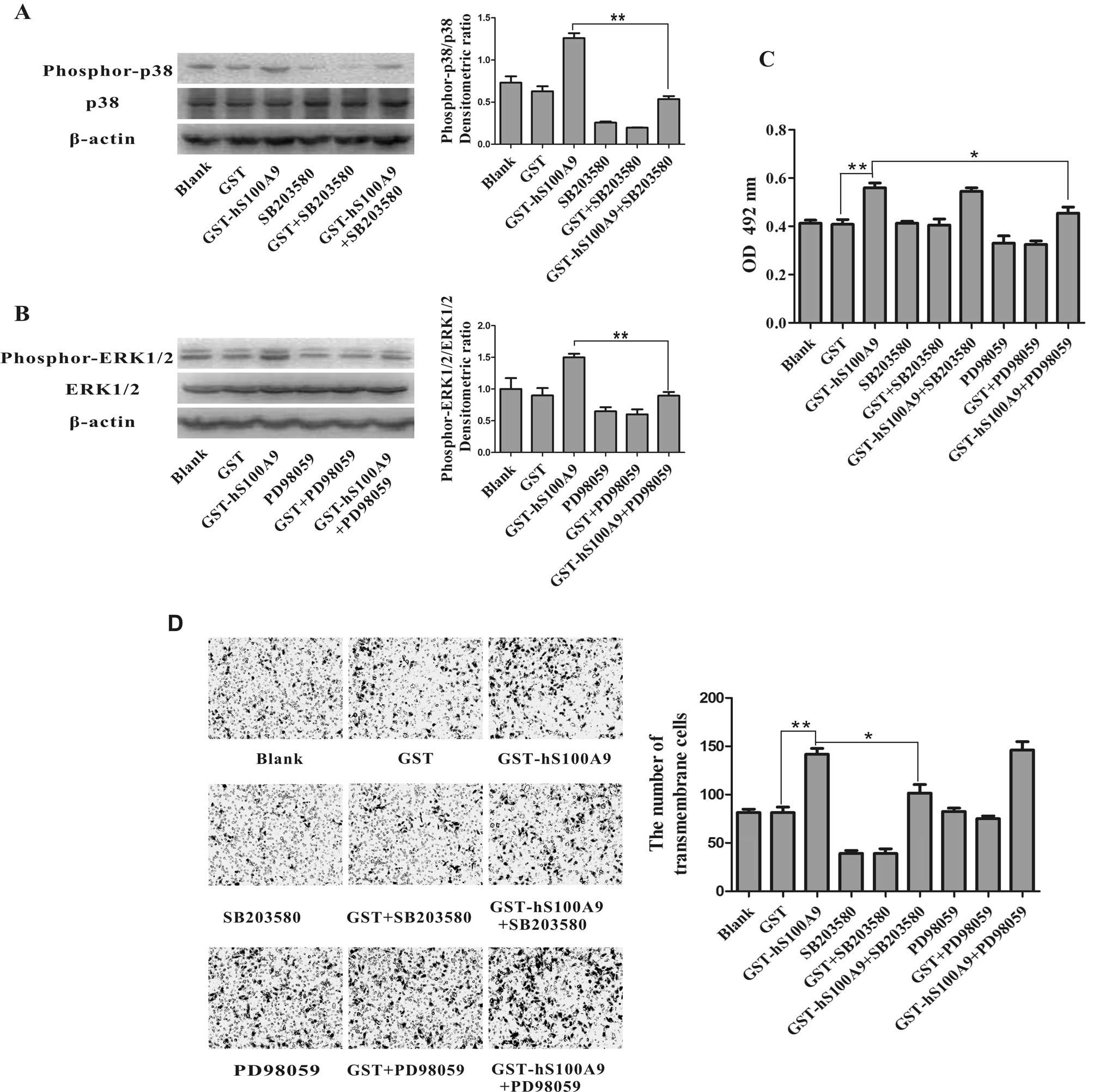|
1
|
Jemal A, Bray F, Center MM, Ferlay J, Ward
E and Forman D: Global cancer statistics. CA Cancer J Clin.
61:69–90. 2011. View Article : Google Scholar
|
|
2
|
Cornella H, Alsinet C and Villanueva A:
Molecular pathogenesis of hepatocellular carcinoma. Alcohol Clin
Exp Res. 35:821–825. 2011. View Article : Google Scholar
|
|
3
|
Bruix J and Sherman M: Management of
hepatocellular carcinoma. Hepatology. 42:1208–1236. 2005.
View Article : Google Scholar
|
|
4
|
Rossi L, Zoratto F, Papa A, et al: Current
approach in the treatment of hepatocellular carcinoma. World J
Gastrointest Oncol. 2:348–359. 2010. View Article : Google Scholar : PubMed/NCBI
|
|
5
|
Donato R: S100: a multigenic family of
calcium-modulated proteins of the EF-hand type with intracellular
and extracellular functional roles. Int J Biochem Cell Biol.
33:637–668. 2001. View Article : Google Scholar : PubMed/NCBI
|
|
6
|
Heizmann CW, Fritz G and Schafer BW: S100
proteins: structure, functions and pathology. Front Biosci.
7:d1356–d1368. 2002. View
Article : Google Scholar : PubMed/NCBI
|
|
7
|
Donato R: Intracellular and extracellular
roles of S100 proteins. Microsc Res Tech. 60:540–551. 2003.
View Article : Google Scholar : PubMed/NCBI
|
|
8
|
Marenholz I, Heizmann CW and Fritz G: S100
proteins in mouse and man: from evolution to function and pathology
(including an update of the nomenclature). Biochem Biophys Res
Commun. 322:1111–1122. 2004. View Article : Google Scholar : PubMed/NCBI
|
|
9
|
Benedyk M, Sopalla C, Nacken W, et al:
HaCaT keratinocytes overexpressing the S100 proteins S100A8 and
S100A9 show increased NADPH oxidase and NF-kappaB activities. J
Invest Dermatol. 127:2001–2011. 2007. View Article : Google Scholar
|
|
10
|
Arai K, Yamada T and Nozawa R:
Immunohistochemical investigation of migration inhibitory
factor-related protein (MRP)-14 expression in hepatocellular
carcinoma. Med Oncol. 17:183–188. 2000. View Article : Google Scholar
|
|
11
|
Nemeth J, Stein I, Haag D, et al: S100A8
and S100A9 are novel nuclear factor kappa B target genes during
malignant progression of murine and human liver carcinogenesis.
Hepatology. 50:1251–1262. 2009. View Article : Google Scholar
|
|
12
|
Srikrishna G: S100A8 and S100A9: new
insights into their roles in malignancy. J Innate Immun. 4:31–40.
2012. View Article : Google Scholar : PubMed/NCBI
|
|
13
|
Ghavami S, Chitayat S, Hashemi M, et al:
S100A8/A9: a Janus-faced molecule in cancer therapy and
tumorgenesis. Eur J Pharmacol. 625:73–83. 2009. View Article : Google Scholar : PubMed/NCBI
|
|
14
|
Turovskaya O, Foell D, Sinha P, et al:
RAGE, carboxylated glycans and S100A8/A9 play essential roles in
colitis-associated carcinogenesis. Carcinogenesis. 29:2035–2043.
2008. View Article : Google Scholar : PubMed/NCBI
|
|
15
|
Ghavami S, Rashedi I, Dattilo BM, et al:
S100A8/A9 at low concentration promotes tumor cell growth via RAGE
ligation and MAP kinase-dependent pathway. J Leukoc Biol.
83:1484–1492. 2008. View Article : Google Scholar : PubMed/NCBI
|
|
16
|
Hermani A, De Servi B, Medunjanin S,
Tessier PA and Mayer D: S100A8 and S100A9 activate MAP kinase and
NF-kappaB signaling pathways and trigger translocation of RAGE in
human prostate cancer cells. Exp Cell Res. 312:184–197. 2006.
View Article : Google Scholar : PubMed/NCBI
|
|
17
|
Ghavami S, Kerkhoff C, Chazin WJ, et al:
S100A8/9 induces cell death via a novel, RAGE-independent pathway
that involves selective release of Smac/DIABLO and Omi/HtrA2.
Biochim Biophys Acta. 1783:297–311. 2008. View Article : Google Scholar : PubMed/NCBI
|
|
18
|
Ghavami S, Eshragi M, Ande SR, et al:
S100A8/A9 induces autophagy and apoptosis via ROS-mediated
cross-talk between mitochondria and lysosomes that involves BNIP3.
Cell Res. 20:314–331. 2010. View Article : Google Scholar : PubMed/NCBI
|
|
19
|
Schmidt CM, McKillop IH, Cahill PA and
Sitzmann JV: The role of cAMP-MAPK signalling in the regulation of
human hepatocellular carcinoma growth in vitro. Eur J Gastroenterol
Hepatol. 11:1393–1399. 1999. View Article : Google Scholar : PubMed/NCBI
|
|
20
|
Huynh H, Nguyen TT, Chow KH, Tan PH, Soo
KC and Tran E: Over-expression of the mitogen-activated protein
kinase (MAPK) kinase (MEK)-MAPK in hepatocellular carcinoma: its
role in tumor progression and apoptosis. BMC Gastroenterol.
3:192003. View Article : Google Scholar : PubMed/NCBI
|
|
21
|
Nakagawa H and Maeda S: Molecular
mechanisms of liver injury and hepatocarcinogenesis: focusing on
the role of stress-activated MAPK. Patholog Res Int.
2012:1728942012.PubMed/NCBI
|
|
22
|
Ichikawa M, Williams R, Wang L, Vogl T and
Srikrishna G: S100A8/A9 activate key genes and pathways in colon
tumor progression. Mol Cancer Res. 9:133–148. 2011. View Article : Google Scholar : PubMed/NCBI
|
|
23
|
You L, Xu LL, Guo YY, et al: Prokaryotic
expression, purification and identification of GST-human S100A9
fusion protein. Chin J Biochem Pharm. 32:253–256. 2011.
|
|
24
|
Punathil T, Tollefsbol TO and Katiyar SK:
EGCG inhibits mammary cancer cell migration through inhibition of
nitric oxide synthase and guanylate cyclase. Biochem Biophys Res
Commun. 375:162–167. 2008. View Article : Google Scholar : PubMed/NCBI
|
|
25
|
Ang CW, Nedjadi T, Sheikh AA, et al: Smad4
loss is associated with fewer S100A8-positive monocytes in
colorectal tumors and attenuated response to S100A8 in colorectal
and pancreatic cancer cells. Carcinogenesis. 31:1541–1551. 2010.
View Article : Google Scholar
|
|
26
|
Arai K, Takano S, Teratani T, Ito Y,
Yamada T and Nozawa R: S100A8 and S100A9 overexpression is
associated with poor pathological parameters in invasive ductal
carcinoma of the breast. Curr Cancer Drug Targets. 8:243–252. 2008.
View Article : Google Scholar : PubMed/NCBI
|
|
27
|
Sakurai T, He G, Matsuzawa A, et al:
Hepatocyte necrosis induced by oxidative stress and IL-1 alpha
release mediate carcinogen-induced compensatory proliferation and
liver tumorigenesis. Cancer Cell. 14:156–165. 2008. View Article : Google Scholar
|
|
28
|
Spaziani A, Alisi A, Sanna D and Balsano
C: Role of p38 MAPK and RNA-dependent protein kinase (PKR) in
hepatitis C virus core-dependent nuclear delocalization of cyclin
B1. J Biol Chem. 281:10983–10989. 2006. View Article : Google Scholar
|
|
29
|
Gailhouste L, Ezan F, Bessard A, et al:
RNAi-mediated MEK1 knock-down prevents ERK1/2 activation and
abolishes human hepatocarcinoma growth in vitro and in vivo. Int J
Cancer. 126:1367–1377. 2010.PubMed/NCBI
|
|
30
|
Guo L, Guo Y, Xiao S and Shi X: Protein
kinase p-JNK is correlated with the activation of AP-1 and its
associated Jun family proteins in hepatocellular carcinoma. Life
Sci. 77:1869–1878. 2005. View Article : Google Scholar : PubMed/NCBI
|
|
31
|
Min L, He B and Hui L: Mitogen-activated
protein kinases in hepatocellular carcinoma development. Semin
Cancer Biol. 21:10–20. 2011. View Article : Google Scholar : PubMed/NCBI
|
|
32
|
Simard JC, Girard D and Tessier PA:
Induction of neutrophil degranulation by S100A9 via a
MAPK-dependent mechanism. J Leukoc Biol. 87:905–914. 2010.
View Article : Google Scholar : PubMed/NCBI
|
|
33
|
Sunahori K, Yamamura M, Yamana J, et al:
The S100A8/A9 heterodimer amplifies proinflammatory cytokine
production by macrophages via activation of nuclear factor kappa B
and p38 mitogen-activated protein kinase in rheumatoid arthritis.
Arthritis Res Ther. 8:R692006. View
Article : Google Scholar
|
|
34
|
Ehlermann P, Eggers K, Bierhaus A, et al:
Increased proinflammatory endothelial response to S100A8/A9 after
preactivation through advanced glycation end products. Cardiovasc
Diabetol. 5:62006. View Article : Google Scholar
|
|
35
|
Hiwatashi K, Ueno S, Abeyama K, et al: A
novel function of the receptor for advanced glycation end-products
(RAGE) in association with tumorigenesis and tumor differentiation
of HCC. Ann Surg Oncol. 15:923–933. 2008. View Article : Google Scholar : PubMed/NCBI
|
|
36
|
Hoefen RJ and Berk BC: The role of MAP
kinases in endothelial activation. Vascul Pharmacol. 38:271–273.
2002. View Article : Google Scholar : PubMed/NCBI
|
|
37
|
Lee HC, Tian B, Sedivy JM, Wands JR and
Kim M: Loss of Raf kinase inhibitor protein promotes cell
proliferation and migration of human hepatoma cells.
Gastroenterology. 131:1208–1217. 2006. View Article : Google Scholar : PubMed/NCBI
|
|
38
|
Montesano R, Soriano JV, Hosseini G,
Pepper MS and Schramek H: Constitutively active mitogen-activated
protein kinase kinase MEK1 disrupts morphogenesis and induces an
invasive phenotype in Madin-Darby canine kidney epithelial cells.
Cell Growth Differ. 10:317–332. 1999.
|
|
39
|
Behren A, Binder K, Vucelic G, et al: The
p38 SAPK pathway is required for Ha-ras induced in vitro invasion
of NIH3T3 cells. Exp Cell Res. 303:321–330. 2005. View Article : Google Scholar : PubMed/NCBI
|
|
40
|
Huang X, Chen S, Xu L, et al: Genistein
inhibits p38 map kinase activation, matrix metalloproteinase type
2, and cell invasion in human prostate epithelial cells. Cancer
Res. 65:3470–3478. 2005.
|
|
41
|
Ringshausen I, Dechow T, Schneller F, et
al: Constitutive activation of the MAPkinase p38 is critical for
MMP-9 production and survival of B-CLL cells on bone marrow stromal
cells. Leukemia. 18:1964–1970. 2004. View Article : Google Scholar : PubMed/NCBI
|















